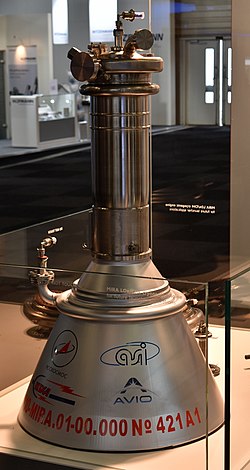 LM-10 MIRA model at Le Bourget LM-10 MIRA model at Le Bourget | |
| Country of origin | Italy European Union |
|---|---|
| Designer | Avio, KBKhA |
| Manufacturer | Avio |
| Application | Upper stage |
| Associated LV | Vega |
| Predecessor | RD-0146 |
| Status | Under development |
| Liquid-fuel engine | |
| Propellant | LOX / CH4 |
| Mixture ratio | 3.4 |
| Cycle | Expander |
| Pumps | 1 |
| Configuration | |
| Chamber | 1 |
| Nozzle ratio | 40 |
| Performance | |
| Thrust | 98 kN (22,000 lbf) |
| Specific impulse | 362 s (3.55 km/s) |
| Used in | |
| Vega-E | |
| References | |
| Notes | |
M10 is a liquid-fuel upper-stage rocket engine in development by Avio on behalf of European Space Agency for use on Vega E. The engine, initially known as LM10-MIRA, was a derivation of the existing Russian RD-0146 engine and result of a past collaboration between Avio and Chemical Automatics Design Bureau (KBKhA) ended in 2014 after the escalation of the Russo-Ukrainian conflict and consequent economic sanctions. On May 6, 2022 engine testing campaign started at Salto di Quirra, Sardinia, with consequent maiden flight on a Vega-E launcher expected by 2026 from Guiana Space Centre.
Overview
The M10 engine is the first operational European methane rocket engine, conceived for use on upper stages of future Vega-E and Vega-E Light launchers, in which will replace both the solid-fueled Zefiro 3rd stage and hydrazine-fueled AVUM 4th upper stage. An industrial team directed by Avio with companies of Austria, Belgium, France, Czech Republic, Romania and Switzerland will manufacture the engine. The M10 minimum thrust requirements are a thrust of 98 kN (22,000 lbf) with a propellant mixture ratio of 3.4 and a minimum specific impulse of 362s.
Development
A feasibility study on improving Vega began in 2004, when the rocket was still in development, with the aim of increase performance, reduce costs and move away from toxic hydrazine fuels. The study proposed a new three-stage version of the rocket named Lyra with a liquid oxygen-methane upper stage. In 2007 Avio and KBKhA started the collaboration for the development of such an engine under an agreement signed between Italian and Russian governments in Moscow on November 28, 2000. The first phase of the collaboration, ended in 2008, aimed at designing a concept for a 10t thrust LOx-LNG engine. The second phase of the collaboration focused instead on designing, manufacturing and testing a 7.5t thrust LM10-MIRA demonstrator engine. The engine was successfully tested in June 2014 in Voronezh, Russia.
After the end of the collaboration with KBKhA, Avio continued the development of M10 under the Vega-Evolution program returning to the original target thrust of 10t. Objectives were finalizing development of main subsystems such as turbopumps, valves, igniter, thrust vectoring and a new ALM 3D printed Thrust Chamber Assembly (TCA). A subscale model of the TCA was tested successfully on 13 November 2018 in Colleferro, Italy.
In February 2020 a full scale engine prototype with a 3D printed TCA was successfully tested at NASA Marshall Space Flight Center, firing 19 times for a total of 450 seconds.
On May 6 2022, the engine test and qualification campaign started in Avio's new Space Propulsion Test Facility (SPTF) at the Salto di Quirra with a single firing of 20 seconds. The first series of testing concluded successfully in July 2022 with a total ignition time of more than 800 seconds.
See also
Comparable engines
References
- ^ "Motore M10" [Engine M10] (in Italian). Avio. Retrieved 24 March 2021.
- ^ Kajon, D.; Liuzzi, D.; Boffa, C.; Rudnykh, M.; Drigo, D.; Arione, L.; Ierado, N.; Sirbi, A. (2019). "Development of the liquid oxygen and methane M10 rocket engine for the Vega-E upper stage" (PDF). 8th European Conference for Aeronautics and Space Sciences. doi:10.13009/EUCASS2019-315. Retrieved 24 March 2021.
- R. Battiston (30 June 2016). "Italian Contribution to Innovative Space Propulsion & Re-entry missions" (PDF). CESMA, Centro Studi Militari Aeronautici "Giulio Douhet". Archived from the original on 26 November 2018. Retrieved 24 March 2021.
- ^ P. Bellomi; M. Rudnykh; S. Carapellese; D. Liuzzi; G. Caggiano; L. Arione; A.A. Gurtovoy; S.D. Lobov; V. S. Rachuk (8 February 2019). "Development of LM10-MIRA liquid oxygen – liquid natural gas expander cycle demonstrator engine". Progress in Propulsion Physics – Volume 11. pp. 447–466. doi:10.1051/eucass/201911447. ISBN 978-5-94588-228-7. S2CID 139531422. Retrieved 23 March 2021.
- Aliberti, Marco; Lisitsyna, Ksenia (May 2018). Russia's Posture in Space: Prospects for Europe. European Space Policy Institute. p. 2. doi:10.1007/978-3-319-78960-6. ISBN 978-3-319-90554-9. S2CID 187915217. Retrieved 10 May 2022.
- ^ Cozzi, Emilio (13 November 2018). "Il primo propulsore europeo a metano liquido ha passato il collaudo". Wired Italia (in Italian). Retrieved 10 May 2022.
- "New launch service contracts for Vega C and new development activities". Avio (Press release). 20 January 2022. Retrieved 20 January 2022.
- Avio (21 November 2018). "Hot fire test of prototype engine thrust chamber for future Vega Evolution". ESA. Retrieved 24 March 2021.
- "3D-printed thrust chamber passes first tests for Vega evolutions". ESA. 3 March 2020. Retrieved 24 March 2021.
- "First half 2022 results". Avio (Press release). 9 September 2022. Retrieved 16 September 2022.
| Rocket engines and solid motors for orbital launch vehicles | ||||||||||||||||||
|---|---|---|---|---|---|---|---|---|---|---|---|---|---|---|---|---|---|---|
| Liquid fuel |
|  | ||||||||||||||||
| Solid fuel |
| |||||||||||||||||
| ||||||||||||||||||